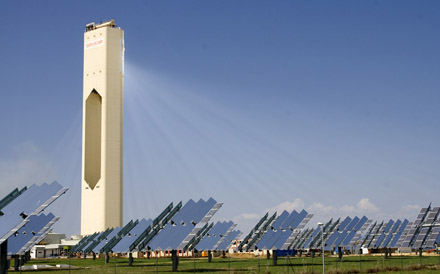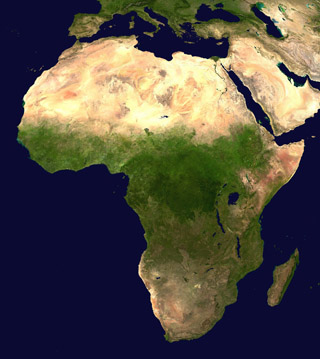Navigation
African Environment Ministers Reach Significant Climate Change Accord
The United Nations Environment Programme announced a landmark agreement reached by over 30 African ministers mainstream climate change adaptation measures into national and regional development plans, policies and strategies on May 29, 2009.
 |
| In the realm of the possible for Africa: Solucar PS10 is the first solar thermal power plant based on a tower design in the world that generates electricity commercially. It concentrates sunlight from a field of heliostats on a central tower. It is located in Sanlúcar la Mayor near Seville, Spain. Photo from Wikipedia. |
Africa needs substantially scaled-up finance, technology and capacity-building to combat climate change.
 |
| Africa seen from satellite. An orthographic image from NASA. |
The United Nations Environment Programme announced a landmark agreement reached by over 30 African ministers mainstream climate change adaptation measures into national and regional development plans, policies and strategies on May 29, 2009.
The Nairobi Declaration adopted at the Special Session of the African Ministerial Conference on the Environment (AMCEN) aims to ensure adequate adaptation to climate change in the areas of water resources, agriculture, health, infrastructure, biodiversity and ecosystems, forest, urban management, tourism, food and energy security and management of coastal and marine resources.
The Declaration also calls on the international community to support the continent in implementing climate change programmes while at the same time achieving sustainable development, with an emphasis on the most vulnerable, such as women and children, who bear the brunt of the impact of global warming.
“Africa’s environment ministers have today signalled their resolve to be part of the solution to the climate change challenge by forging a unified position, within their diversity of economies, in advance of the crucial UN climate change convention meeting in Copenhagen in just 192 days time,” said UNEP Executive Director Achim Steiner.
The head of UNEP, which hosts the AMCEN secretariat, added that the “development prize for Africa is an acceleration of clean and renewable energy projects and payments for carbon-storing ecosystems from forests up to eventually perhaps dry land soils, grasslands and sustainable agriculture.”
Mr. Steiner stressed that Africa has “shouldered its domestic and global responsibilities. It is now time for other continents and countries, especially the developed economies, to now seriously shoulder theirs.”
According to UNEP, Africa has the lowest per capita greenhouse gas emissions rate, but bears the highest impact of climate change. It is predicted that some African countries will suffer reduced harvests of up to 50 per cent from rain-fed agriculture by 2020. During the same timeframe, between 75 million and 250 million people are expected to be exposed to increased water stress due to changes in the continent’s environment.
Since the Kyoto Protocol – a UN treaty designed to limit greenhouse gas
emissions – was drawn up in 1997, there has been some progress in acknowledging the need to support adaptation in developing countries. However, little has been done, with the cost of adaptation in Africa estimated between $1 billion to $50 billion per year.
The AMCEN gathering brought around 300 African negotiators, high-level experts, civil society organizations and ministers together with a view to work towards a shared vision on climate change and develop a single African voice in Copenhagen and to advance the continent’s interests in negotiations for the climate change regime beyond 2012, when the Kyoto Protocol expires.
The Declaration highlights the need for a coherent financial mechanism to battle climate change, with equitable governance and simplified access procedures.
 |
| Modern wind energy plant in rural scenery. Une éolienne moderne dans un paysage rural. Photo by Wagner Christian from Wikipedia. |
In this regard, African ministers are advocating for the improvement and modification of the Clean Development Mechanism (CDM) in order to ensure equitable geographical distribution of projects that contribute to sustainable development efforts on the continent.
They are also calling for the expansion of eligible categories to benefit from carbon credits and other international incentives to include sustainable land use, agriculture and forest management, in order to promote agricultural productivity in a way that improves resilience and adaptation to climate change.
They recommend that the Group of Eight (G-8) industrialized nations implement the recommendation to create a regional climate centre in Africa to improve climate risk management and to carry out the regional strategy for disaster-risk reduction.
As well as pressing for modification in the CDM and other international incentives – such as carbon credits – to include sustainable land use, agriculture and forest management, the ministers called on developed countries to set ambitious targets to reduce their emissions by 2020.
________________
This news is from the UN News Centre.
Search
Latest articles
Agriculture
- World Water Week: Healthy ecosystems essential to human health: from coronavirus to malnutrition Online session Wednesday 24 August 17:00-18:20
- World Water Week: Healthy ecosystems essential to human health: from coronavirus to malnutrition Online session Wednesday 24 August 17:00-18:20
Air Pollution
- "Water and Sanitation-Related Diseases and the Changing Environment: Challenges, Interventions, and Preventive Measures" Volume 2 Is Now Available
- Global Innovation Exchange Co-Created by Horizon International, USAID, Bill and Melinda Gates Foundation and Others
Biodiversity
- It is time for international mobilization against climate change
- World Water Week: Healthy ecosystems essential to human health: from coronavirus to malnutrition Online session Wednesday 24 August 17:00-18:20
Desertification
- World Water Week: Healthy ecosystems essential to human health: from coronavirus to malnutrition Online session Wednesday 24 August 17:00-18:20
- UN Food Systems Summit Receives Over 1,200 Ideas to Help Meet Sustainable Development Goals
Endangered Species
- Mangrove Action Project Collaborates to Restore and Preserve Mangrove Ecosystems
- Coral Research in Palau offers a “Glimmer of Hope”
Energy
- Global Innovation Exchange Co-Created by Horizon International, USAID, Bill and Melinda Gates Foundation and Others
- Wildlife Preservation in Southeast Nova Scotia
Exhibits
- Global Innovation Exchange Co-Created by Horizon International, USAID, Bill and Melinda Gates Foundation and Others
- Coral Reefs
Forests
- NASA Satellites Reveal Major Shifts in Global Freshwater Updated June 2020
- Global Innovation Exchange Co-Created by Horizon International, USAID, Bill and Melinda Gates Foundation and Others
Global Climate Change
- It is time for international mobilization against climate change
- It is time for international mobilization against climate change
Global Health
- World Water Week: Healthy ecosystems essential to human health: from coronavirus to malnutrition Online session Wednesday 24 August 17:00-18:20
- More than 400 schoolgirls, family and teachers rescued from Afghanistan by small coalition
Industry
- "Water and Sanitation-Related Diseases and the Changing Environment: Challenges, Interventions, and Preventive Measures" Volume 2 Is Now Available
- Global Innovation Exchange Co-Created by Horizon International, USAID, Bill and Melinda Gates Foundation and Others
Natural Disaster Relief
- STOP ATTACKS ON HEALTH CARE IN UKRAINE
- Global Innovation Exchange Co-Created by Horizon International, USAID, Bill and Melinda Gates Foundation and Others
News and Special Reports
- World Water Week: Healthy ecosystems essential to human health: from coronavirus to malnutrition Online session Wednesday 24 August 17:00-18:20
- STOP ATTACKS ON HEALTH CARE IN UKRAINE
Oceans, Coral Reefs
- World Water Week: Healthy ecosystems essential to human health: from coronavirus to malnutrition Online session Wednesday 24 August 17:00-18:20
- Mangrove Action Project Collaborates to Restore and Preserve Mangrove Ecosystems
Pollution
- Zakaria Ouedraogo of Burkina Faso Produces Film “Nzoue Fiyen: Water Not Drinkable”
- "Water and Sanitation-Related Diseases and the Changing Environment: Challenges, Interventions, and Preventive Measures" Volume 2 Is Now Available
Population
- "Water and Sanitation-Related Diseases and the Changing Environment: Challenges, Interventions, and Preventive Measures" Volume 2 Is Now Available
- "Water and Sanitation-Related Diseases and the Changing Environment: Challenges, Interventions, and Preventive Measures" Volume 2 Is Now Available
Public Health
- Honouring the visionary behind India’s sanitation revolution
- Honouring the visionary behind India’s sanitation revolution
Rivers
- World Water Week: Healthy ecosystems essential to human health: from coronavirus to malnutrition Online session Wednesday 24 August 17:00-18:20
- Mangrove Action Project Collaborates to Restore and Preserve Mangrove Ecosystems
Sanitation
- Honouring the visionary behind India’s sanitation revolution
- Honouring the visionary behind India’s sanitation revolution
Toxic Chemicals
- "Water and Sanitation-Related Diseases and the Changing Environment: Challenges, Interventions, and Preventive Measures" Volume 2 Is Now Available
- Actions to Prevent Polluted Drinking Water in the United States
Transportation
- "Water and Sanitation-Related Diseases and the Changing Environment: Challenges, Interventions, and Preventive Measures" Volume 2 Is Now Available
- Urbanization Provides Opportunities for Transition to a Green Economy, Says New Report
Waste Management
- Honouring the visionary behind India’s sanitation revolution
- Honouring the visionary behind India’s sanitation revolution
Water
- Honouring the visionary behind India’s sanitation revolution
- Honouring the visionary behind India’s sanitation revolution
Water and Sanitation
- Honouring the visionary behind India’s sanitation revolution
- Honouring the visionary behind India’s sanitation revolution

